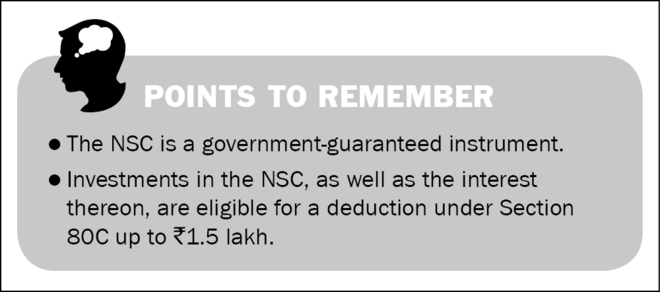
What is National Savings Certificate?
The National Savings Certificate (NSC) is a popular and safe small-savings instrument that combines tax savings with guaranteed returns. This scheme is backed by the government and is available at post offices. The distribution reach of India Post has made it popular.
Features of National Savings Certificate
- Eligibility: You need to be a resident Indian to buy the National Savings Certificate.
- Entry age: No age is specified for opening an account.
- Investments: Minimum: Rs 1,000, Maximum: No limit. Certificates are available in multiples of Rs 100.
- Tenure: Five years.
- Account-holding categories: (i) Individual, (ii) Joint, (iii) Minor through the guardian, (iv) Minor above 10 years.
- Nomination: Facility is available.
National Saving Certificate interest rate
The interest rate of NSC is 6.80 per cent which is compounded annually.
Investment objective and risks
The main objective of investing in the National Savings Certificate is to get a tax deduction on deposits and guaranteed returns on investment.
Capital and inflation protection
The capital in the National Savings Certificate is completely protected, as the scheme is backed by the Government of India. The NSC is not inflation-protected. This means whenever inflation is above the current guaranteed interest rate, the deposit earns no real returns. However, when the inflation rate is below the guaranteed interest rate, it does manage a positive real rate of return.
Suitability and alternatives
- Suitable for conservative investors seeking assured returns from a lump sum investment for goals up to five years away and tax exemption under Section 80C.
- Not suitable for long-term wealth creation, given their inability to provide any meaningful returns above the rate of inflation. Also not suitable for investors looking to invest small amounts regularly.
- Alternatives can be five-year bank fixed deposit, five-year Post Office Time Deposit, Debt mutual funds (which offer better returns but do not provide tax exemption), Company deposits (though they do not provide tax exemption).
Guarantees
The interest rate on the National Savings Certificate is guaranteed. Currently, the interest rate on NSC is 6.80 per cent on the five-year option, compounded annually. The ten-year option of the NSC has been discontinued. From FY 2016-17 onwards, the interest rate on the NSC is revised every quarter as per the prevailing government-bond rates. However, once you have invested in the National Savings Certificate, the rate applicable that time will remain the same throughout the investment tenure.
Liquidity
Liquidity in the NSC is available in the form of loans since you can borrow against your NSC savings.
Exit option
The investment in the National Savings Certificate is locked-in for its tenure. Premature encashment is possible in case of the death of the certificate holder. The NSC is also transferable.
Tax implications
The sum invested in the National Savings Certificate is eligible for a tax deduction under Section 80C up to the Rs 1.5 lakh limit stipulated in a financial year, including the accrued interest on the existing certificates. Since the interest earned on the NSC is automatically reinvested, it can be claimed as a deduction under Section 80C. But if the accrued interest is not added to the Rs 1.5 lakh deduction under Section 80C, then the entire income is taxable on maturity.
Where to buy
The National Savings Certificate can be bought from any head or general post office.
How to buy
- You need to fill the NSC application form available at the post office.
- Carry the original identity proof for verification at the time of buying.
- You can buy the certificate with cash, cheque or demand draft drawn in favour of the postmaster of the post office from where the National Savings Certificate is being bought.
- Choose a nominee.
Additional information
- National saving certificates are encashable at any post office in India, provided one has obtained transfer rights.
- NSC certificates are transferable across post offices.
- Interest income is taxable (if not claimed under Section 80C) but no tax is deducted at the source.


To view the current rates on the schemes, go to vro.in/s34211




